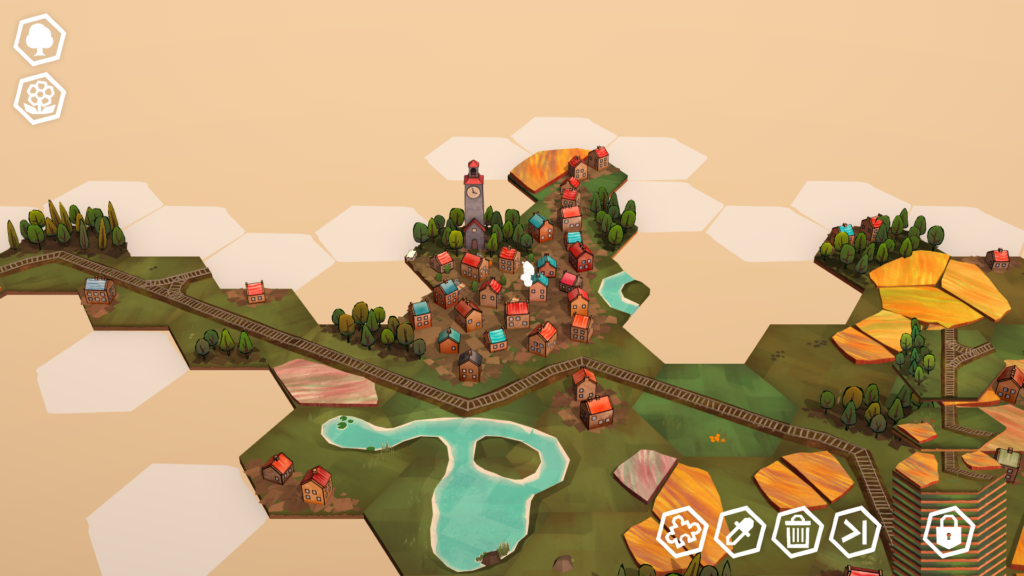Escapism is a mainstay of queer culture, from fantasies of cottagecore lesbians to the gay bar scene. Though such escapism takes many drastically different forms, it is ubiquitous in the LGBTQ+ community. These fantasies and spaces serve their purpose by being fundamentally disconnected from broader reality; there is no implication of queer oppression on a cottagecore farm, and the gay bar scene provides a space where queer people are free from a broader cis-heteronormative society, albeit temporarily.
In the twenty-first century, new technology has given the queer community more ways to engage in such escapism. Perhaps the most significant of these ways is video games; video games are a widely utilized means of escapism for all people, especially the queer community. Queer-focused games allow LGBTQ+ people to escape into a space of their community and culture. Amongst these games has arisen a sub-genre of minimalistic, peaceful, detached-from-reality games that act as a perfect microcosm of the queer community’s escapism, and escapism generally. This sub-genre is perhaps best seen in the games Dorfromantik and Townscaper.

These games define the genre, not only through their gameplay, but in fundamental, thematic way. Both Townscaper and Dorfromantik allow you to escape into picturesque, blissful worlds of your own creation with no implication of a world beyond. They are almost a perfect manifestation of the phenomenon of queer escapism. There is no hint nor implication of the existence of policy violence, LGBTQ+ discrimination, anti-queer bigotry, or queer oppression generally; these worlds you can create act as a respite from such things, an escape to a beautiful fictional world where the plights of the queer community aren’t even extant as a concept.
Dorfromantik is a game that itself practically screams escapism. The 2021 game’s name translates literally to “village romanticization,” and the game itself reflects this. While Dorfromantik is technically a puzzle game, there really isn’t anything to solve in a traditional sense; in the game, you need to place tiles of plains, farmland, forest, villages, rail lines, and water in a way that best aligns them with their surrounding tiles to get both more tiles and points. However, this is secondary to the true focus of the game, creating beautiful and idyllic worlds in the game’s characteristically minimalist, cut-paper-esque art style. Dorfromantik delights in the fact that it’s not a particularly competitive nor traditional game but rather is serene, peaceful, and abstract. I certainly felt such in my personal experiences playing Dorfromantik.
While playing the game, I could always imagine myself in a better world amongst the small towns and lavender fields I had placed. Free of the plights of my life, I would live blissfully and peacefully amongst friends in a beautiful cottage in town, I would read queer books while lying in the impossibly idyllic forests that inevitably sprawl across the landscape in each playthrough, I would be happy amongst by community. Daydreams such as this are easy to slip into when playing Dorfromantik, especially when playing alone and late in the night like I often do. Like much escapism, particularly queer escapism, it provides a strange comfort and hope; I’m comforted by the idea of such a reality, even thought the one I built will never be realized. I’m comforted by the feelings of freedom, peace, and liberation, even if I’ll never feel them in an idyllic cottage or serene farm. It’s a wonderful escape. However, Dorfromantik is certainly not the only game that has made me feel this way.
The 2020 game Townscaper is, in many ways, very similar to Dorfromantik; it’s a serene, tile-based, and minimalistic game that centers on endlessly creating vast and beautiful worlds. However, any sense of traditional gameplay or competition that is present in Dorfromantik is not in Townscaper. There are no points, no quests, no requirements to get new tiles; there is only you, an endless sea, and the ability to create idyllic towns that will never exist in real life. Despite this inherent distance from reality, the game never fails to make me feel a real sense of escape.
Townscaper quite literally is an opportunity to create the perfect world, not only in the game but in your own imagination. As I create the canal cities and garden communities of my dreams in the game, my mind naturally wanders to life in the impossibly beautiful world I’ve created; this inevitably leads to daydreams of escaping to such a world, the absolute bliss I would feel there. Imagining a world where my community is liberated and free to live in peace, where our human rights are never at risk and are just inherent, is a common thought of mine as an avid queer activist; however, Townscaper allows me to build what that world would look like, allows me to imagine myself in a physical space of that dream. Frankly, it’s often a much needed dose of hopeful escapism.
However, the LGBTQ+ community is not the only group of people who can enjoy such escapism, these games can be an escape for anyone who has something to escape from. People of color can find temporary refuge from their oppression, Muslims can imagine themselves in these worlds free of islamophobia, and people generally can escape to these worlds from the horrific realities of our tragic, oppression fraught, late-stage capitalist world. These games provide us with the relief of a better, albeit false, reality. While these games certainly are not a solution, nor any proposal of a solution, to the problems that plague queer people and humanity generally, they do provide a beautiful, idyllic escape from such problems, an escape that can give us all much needed peace, hope, and relief.